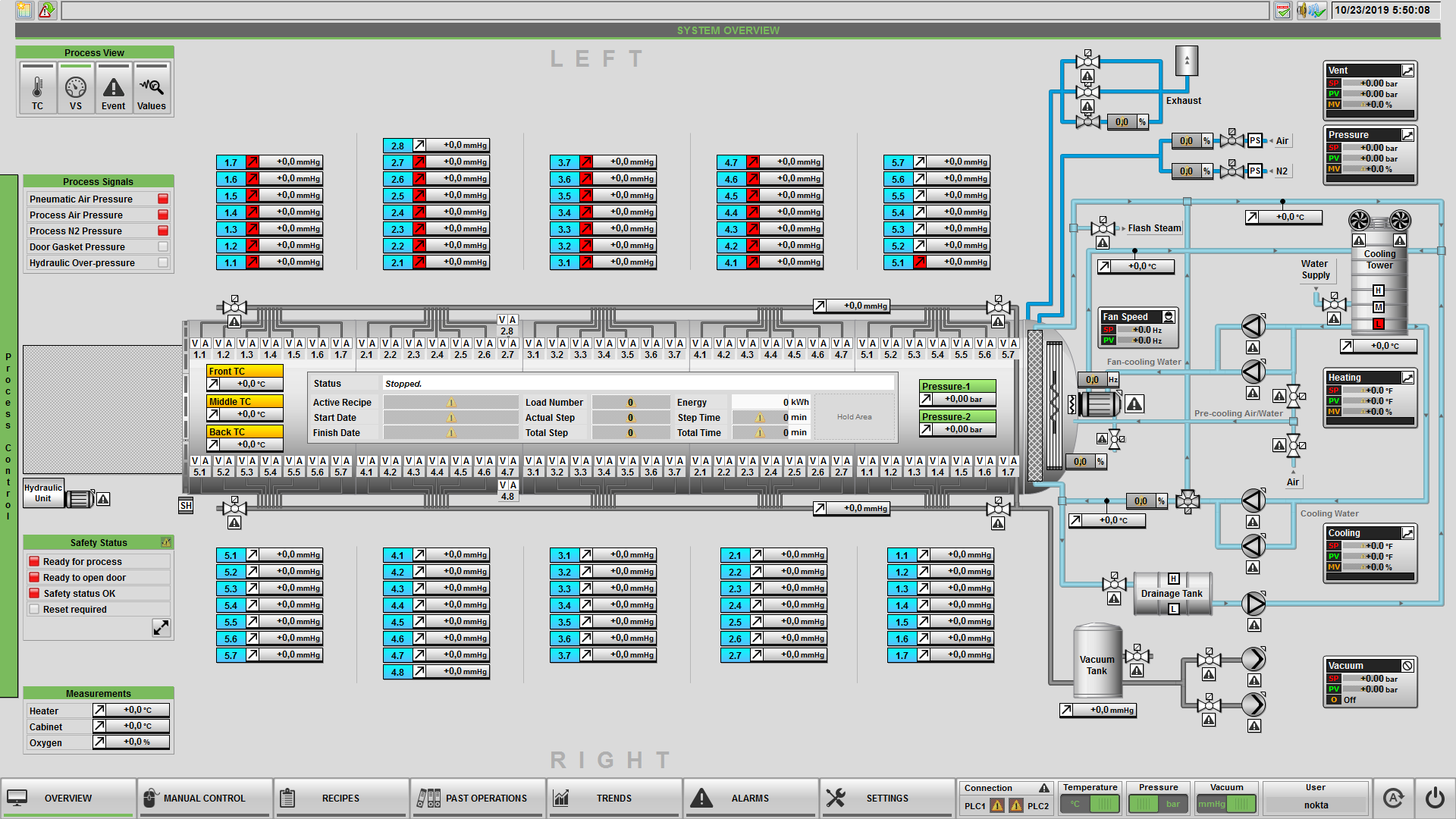Versatility and Traceability in Composite Production: ACAS Control System by Akarmak!
Akarmak, a company specializing in autoclave control systems, offers its most advanced work with ACAS (Akarmak Composite Autoclave SCADA), developed specifically for the composite manufacturing industry.
In today's industrial world, there is an expectation for production processes to be better managed, user-friendly, and highly efficient in control systems. The ACAS control system utilizes Siemens WinCC architecture, fully compliant with AMS2750 as well as Boeing BSS-7123 (formerly D6-49327), BAC 5317, Airbus AP-3222 and NADCAP requirements, and offers numerous user-friendly capabilities, saving time during daily routines. With top-tier hardware support, ACAS ensures efficient and consistent process results.
ACAS caters to the composite manufacturing industry's expectations with numerous built-in features, ensuring high efficiency and quality assurance in products. Additionally, the control system must meet the expectations of accuracy and traceability of each cycle, maintaining operation history over the years.

Let's explore the capabilities and benefits of ACAS, designed to meet these requirements:
PRECISION AND COMPLIANCE:
In industries like aviation and defense, where composite materials are extensively used, the quality standards for manufactured parts are exceedingly high. To maintain this level of quality, autoclave equipment and process parameters are determined based on specific criteria. ACAS supports precise process control with high-end hardware choices, including SAT and TUS (System Accuracy Tests & Temperature Uniformity Survey), as detailed in the AMS2750-Pyrometry standard. The system's measurement instruments are compliant with these standards, and the use of PLC, SCR, proportional valves, and finely-tuned PID parameters based on configuration, provides expert control capabilities for ACAS. Regular system calibration is essential to maintain continuity and compliance with these standards. Ensuring our autoclaves' safety is as crucial as process quality, involving safety sensors and switches controlled by a Safety PLC, along with various electrical and mechanical locking features. ACAS always performs checks to ensure system safety before allowing the user to initiate the process.
PROCESS RECIPE:
A critical element for efficient and repeatable production processes is the process recipe. ACAS has a detailed recipe page where users can create various curing profiles in multiple steps. The Recipe section, built on knowledge from various industrial sectors, ensures all products are produced under necessary conditions, preventing incorrect parameter entries by the user.
PROCESS PREPARATION:
Composite autoclaves come in various sizes and configurations, depending on product and capacity targets. To ensure product quality in each process, ACAS allows creating QR-coded job orders for recognition and organizes a more efficient loading operation. These definitions can be saved in the system's library for future recall. To simplify this operation, tablet applications communicating with the ACAS main computer can be integrated. These features are crucial for saving time and preventing confusion with multiple products inside.
TRACEABILITY:
To ensure products are manufactured according to necessary process parameters, autoclaves must have precise measurement equipment and suitable software capabilities. ACAS archives all relevant data in detail at the end of each cycle, offering reports for easy navigation through a wide range of data. The system can communicate with existing ERP systems for data export and uses Quality Cards to quickly determine if the process met predefined conditions for each product during that cycle, saving time and effectively identifying inconsistencies in process results. Additionally, the system records current recipe information and logs any changes made during each cycle. ACAS emphasizes traceability, ensuring the safety of each product's process information and preventing historical alterations due to subsequent changes.
USER AUTHORIZATION:
Besides routine production operations managed by operators, the control system contains specialized modules like Recipe Definition, Maintenance, Calibration, Remote Connection, and Main Process Settings, along with restricted areas only for Process Monitoring. ACAS allows defining users with different authorities within the control system and prevents unauthorized access to certain areas.
CUSTOMIZATION AND MANUAL CONTROLS:
For experienced users, ACAS offers manual control features to override any process condition, such as valve positions and pump status, without compromising system safety. General process settings can be adjusted (e.g., PID Control, fault detection intervals) to improve process efficiency and outcomes.
CALIBRATION & MAINTENANCE:
As mentioned, ensuring the continuity of production efficiency and product quality requires precise hardware and advanced software capabilities. ACAS provides tools for calibrating sensors and informs the user when calibration periods expire. The system also tracks service life for most hardware, offering maintenance suggestions to prevent predictable failures and improve autoclave uptime. SMS notifications for certain failures and remote TCP/IP connection for problem identification and resolution are available, ensuring timely support for users.
These capabilities allow users to perform daily routine operations efficiently and comfortably, contributing significantly to the sustainability of their businesses through the quality of products produced post-production.

